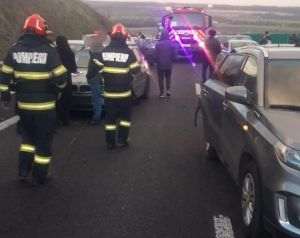Co-financing has represented the main issue in accessing European funding between 2007 and 2013, Agriculture minister Achim Irimescu said, and he stressed that it is essential for Romania to focus on resolving this issue.
He said: "We should have focused on what could be done when it comes to the absorption of European funds, since back in the 2007-2013 period. Romania has already uncommitted almost one billion Euros, as well as many hundred million Euros in corrections and penalties. Even though we have had a good absorption rate, I cannot say that I am pleased with the way things have evolved. We have done all we can for things to improve where absorption is concerned. I have made it may goal to simplify the accession procedures as much as possible".
The Minister of Agriculture has mentioned that the Agency for the Financing of Rural Investments (AFIR) has made a big mistake in being "too forgiving" with the beneficiaries of funds, and thus they have canceled projects amounting to 800 million Euros last year as they did not have the money for co-financing. "I think we shouldn't have been so lenient", the minister said, and he added: "Our beneficiaries have not had money for co-financing. In this context, the AFIR shouldn't have been so lenient on those who did not pay on time.
The agency should have terminated the contracts of those who have been late in the payment of co-financing and allow other applicants to access the funds".
• "We have been unable to make all the direct payments to farmers by June 30"
The deadline of the payment of European grants to farmers will be extended until September 30, as not all the payments could be made successfully by the initial deadline of June 30, said Achim Irimescu.
The minister said: "We have been unable to make all the direct payments to farmers by June 30. We will however meet the requirement of the European Commission, which states that according in order avoid penalties, 80% of the payments must be made by June 30. The deadline will be postponed until September 30 for the 100 or 200 farmers with special issues, that need to be resolved by then".
Achim Irimescu also said that according to European regulations, starting with 2020 no direct payments will be possible without the land registry.
"Currently, out of the 15 million hectares of agricultural land, just three million of them that are located in the unincorporated areas have been recorded in the land registry, so, the situation is disastrous", the minister said.
Romania has asked for an extension of the deadline for the payment of European subsidies in the campaign for the year 2015, without penalties, as the European Commission has announced in June that member states can request such an extension by October 15th, 2016, without the farmers being penalized, according to Agerpres.
"We have asked for that extension, not to slow down the pace of the payments, but to ensure that there aren't going to be any penalties for Romanian farmers. Payments are made at a speedy pace, we know how important it is for all farmers to get their money as quickly as possible", the minister said.
• "The law concerning the acquisitions of agricultural land cannot be passed before September"
It will not be possible to pass the law concerning agricultural land purchases before September, but we will have time to debate it in detail by the time the Parliament resumes its activity", agriculture minister Achim Irimescu said yesterday, according to Agerpres. The official said: "The law has almost been completed in the ministry, and next week we will invite the producers in because it is better to consult with them, to see what suggestions and requests they have, and in the end to write it in such a form that we avoid any problem. I think that through a dialogue with the farmers and with the European Commission we will be capable to pass a law that allows everyone to get what they want".
According to the quoted source, Romania can introduce in the law certain limitations when it comes to the acquisition of farming land only if it has clear objectives to reach, and in that regard the law in France can be taken as a model.
"I think that Romania has some clear objectives to reach, if we think about the need to merge the plots of land, because we are in a very delicate situation, approximately 3.8 million farms, and we are talking about 14 million hectares of agricultural plots of land in Romania, of which 9.3 million hectares are arable", the head of the MADR explained.
When asked if he has any information on how much agricultural land has been sold to foreigners, Irimescu responded: "We do not have certain data on how much land has been sold in Romania".
As for Romania's objectives that might be introduced in the new law in order to allow for limitations on the acquisition side, Irimescu has stressed that aside from the goal of merging plots of land, food supply security may also be introduced.
Romania runs the risk of losing about 80 million Euros in European subsidies because of the Brexit, said Achim Irimescu, according to Agerpres.
"An initial estimate indicates that Great Britain pays 13 billion Euros a year to the European budget, which this year is made up of commitments and payments. The commitments to the European budget are 144 billion Euros and we can make a calculation on what the removal of 13 billion Euros means. I've checked with the colleagues in Brussels and it would affect by 2-3 percent the European budget for Romania", the Minister of Agriculture said.
•
Agriculture minister, Achim Irimescu, wants to raise from the Ministry of Finance about 30 million to subsidize electricity and the filling of the irrigation canals, as meteorologists have predicted draft this summer, and the crops might be affected if they are not irrigated, according to Agerpres.
"We would rather provide support ahead of time for irrigation than pay damages for the losses caused by drought", the minister said, and he went on to say that two weeks from now he is going to present the prime-minister a report with concrete measures that are going to be taken in order to fight drought and put the irrigation system back into operation.
When asked about how the crops are going to look this year, Irimescu said that so far the signals are "very good".


















































